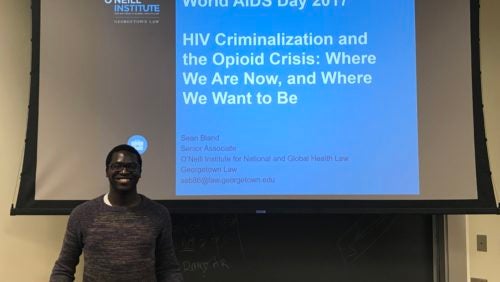Sean Bland (L’13): Addressing HIV Criminalization and the Opioid Crisis
December 1, 2017

Sean Bland, an associate at the O'Neill Institute for National and Global Health Law, gives a presentation on HIV Criminalization and the Opioid Crisis on November 30.
Criminal law and health collide with the prosecution of persons with HIV — so in recognition of World AIDS Day 2017 (December 1), Sean Bland (L’13), an associate at the O’Neill Institute for National and Global Health Law, provided students with a detailed look at “HIV Criminalization and the Opioid Crisis in the United States: Where We Are Now, and Where We Want to Be.”
While the law can be used to protect public health — by reducing the number of infections — statutes that punish persons for transmitting the HIV virus are disproportionately applied to women, persons of color and sex workers.
“We need to reframe a lot of conversations, particularly when we are thinking about HIV criminal laws, around how we can best protect public health,” Bland said. “Often, that is not the focus of these laws.”
Thirty-four states have HIV-specific criminal laws, which need to be modernized. Eleven states criminalize biting or spitting at police officers when an HIV-infected person tries to resist arrest: a New York man was sentenced to ten years for biting, and a Texas man was sentenced to 35 years for spitting, though there is no evidence that HIV is transmitted this way.
People with HIV who inject drugs are also criminalized in various ways, Bland noted; twelve states criminalize syringe sharing or sale by people living with HIV. An HIV outbreak in Scott County, Indiana, with 181 new infections in one year, was linked to the injection of opioid drugs. The increase of opioid use in the United States has exploded, and yet most people are not getting the treatment they need.
What needs to be done? Among other things, increased accessibility to naloxone, which reverses drug overdoses; increased availability of treatment; and substance abuse and syringe exchange programs. There is no evidence, Bland says, that syringe exchanges increase drug use or crime.
“The dominant approach in the U.S. is that we think about drug use purely from a criminal lens,” he says. “What I would support and advocate [for] is thinking about these as public health issues.”